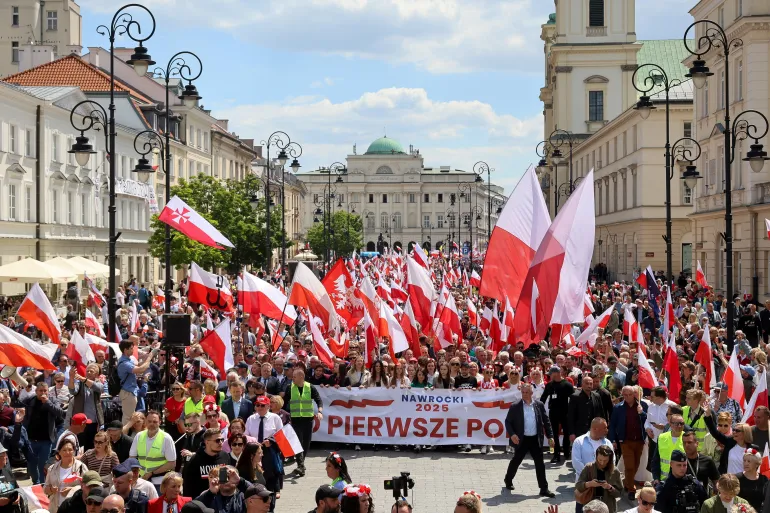Tens of thousands of Poles took to the streets on May 25, 2025, in dueling political marches that highlighted the country’s deep political divisions just days before a crucial presidential election. Supporters of both the ruling right-wing government and the pro-European opposition rallied in major cities, underscoring what many analysts view as Poland’s most consequential vote in decades.
The election will decide whether Poland continues its nationalist, conservative trajectory under the Law and Justice (PiS) party, or pivots toward a more liberal and EU-friendly future with opposition candidate Rafal Trzaskowski.
“This is a battle for Poland’s soul,” said one demonstrator in Warsaw. “We’re choosing between isolation and integration.”
🇵🇱 Nationalist vs. Pro-EU Agendas
The largest PiS-led march took place in Krakow, where party leaders framed the election as a defense of Polish sovereignty, tradition, and Catholic values. President Andrzej Duda, who is not running again, called on voters to back the party’s endorsed candidate, Beata Szydło, warning that a liberal victory would lead to “chaos and foreign interference.”
Meanwhile, in Warsaw, thousands of opposition supporters rallied behind Trzaskowski, the current mayor of the capital and a former Civic Platform minister. His campaign promises to restore judicial independence, rebuild ties with Brussels, and roll back PiS’s media and education reforms.
“We want a Poland that’s modern, open, and democratic,” Trzaskowski told a cheering crowd.
🗳️ High Stakes, High Turnout Expected
Election observers warn of potential disinformation campaigns, as both sides accuse each other of spreading fake news and stirring up anti-democratic rhetoric. The European Union and OSCE will monitor the vote amid concerns over media bias and judicial interference.
“Poland is at a tipping point,” said a Warsaw-based political analyst. “This vote could redefine its place in Europe — or reinforce its turn inward.”
🌍 EU Relations and Domestic Backlash
The election comes at a tense moment in Poland’s relationship with the European Union, which has repeatedly clashed with the PiS government over rule of law violations, abortion restrictions, and LGBTQ+ rights. A win for Trzaskowski could signal a dramatic shift and possibly unlock withheld EU funds tied to judicial reforms.
However, PiS supporters argue that Brussels is trying to undermine Polish sovereignty, and frame the opposition as “agents of foreign influence.” Some government officials have warned that an opposition victory would lead to moral decay and economic instability.
What to Watch
- Final campaign events before the election date (May 30, 2025)
- Voter turnout among youth and Polish diaspora
- Election security and possible post-election protests
- EU response to the outcome, especially regarding funding and legal disputes
- The impact of the results on upcoming parliamentary elections
As Poland approaches a pivotal election, the rival marches serve as a powerful visual of the ideological rift shaping the country’s future. Whether voters choose continuity or change, the outcome will echo far beyond Warsaw — reverberating across Europe’s political landscape.


